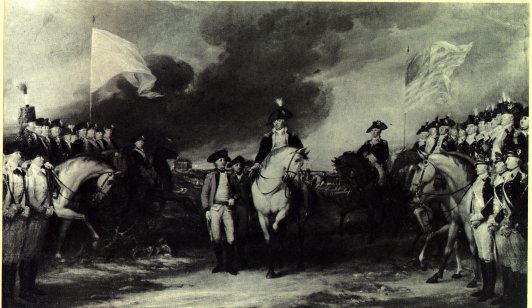
< Previous Page * Next Page >
France had been watching and waiting for revenge since her defeat in 1763, and her enthusiasm for the American cause was high. The French intellectual world, though far as yet from republicanism, was in revolt against feudalism and privilege and, after the Declaration of Independence, Benjamin Franklin had been warmly received at the French court. From the first, the French government had not been neutral, giving the United States aid in the shape of munitions and supplies. But it was reluctant to risk the expense of direct intervention and open war with England. After the news of Burgoyne's surrender, however, Franklin was able to secure treaties of commerce and of alliance, each nation promising to make common cause with the other until American independence was recognized. Even before this, many French volunteers had sailed for America. The most prominent among these was the Marquis de Lafayette, a young army officer who longed to further American liberty, exalt France, abase England, and demonstrate his own military talents. He joined Washington's army as a general, serving without pay and giving such good account of himself that he won the respect of the great American whom he regarded with a measure of hero-worship.
In the winter of 1779-80, Lafayette visited Versailles and persuaded his government to make a real effort to bring the war to an end. Soon after, Louis XVI sent over a fine expeditionary force of 6,000 men under General Rochambeau. In addition, French fleets greatly aggravated the difficulties of the British in supplying and reinforcing their armies, and British commerce suffered heavily from French and American blockade runners, known as privateers, and from the operations of the dashing sea captain, John Paul Jones. Britain also suffered from the entry of Spain and the Netherlands into the war.
 |
| Surrender of Lord Cornwallis, October 19, 1781. |
When the news of the American victory at Yorktown reached Europe, the House of Commons voted to end the war. Soon after, the Prime Minister, Lord North, resigned, and the King organized a new government to conclude peace on the basis of American independence. Peace negotiations began in earnest in April 1782 and continued through November, when preliminary treaties were signed with the British. These were not to take effect until France concluded peace with Great Britain. In 1783, they were signed as final and definitive. The peace settlement acknowledged the independence, freedom, and sovereignty of the thirteen states, to whom it granted the much coveted territory west to the Mississippi, with the northern boundary nearly as it runs now. The Congress was to recommend to the states that they restore the confiscated property of the loyalists, and the people of the United States received the privilege of fishing off Newfoundland and of drying their fish in unsettled parts of Nova Scotia and Labrador.
< Previous Page * Next Page >